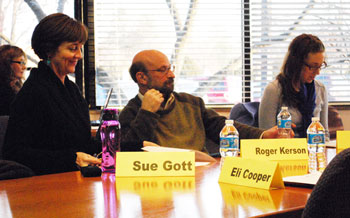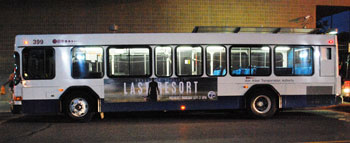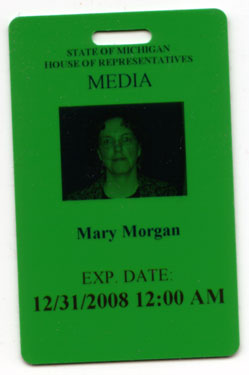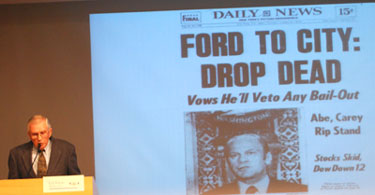Person in minivan flinging copies of Ann Arbor News ad section onto lawns and into driveways.
Stories indexed with the term ‘advertising’
Saline
In the parking lot of 14A4 District Court on Thursday, Feb. 20, 2014 – back window of a car advertising attorney Timothy Macdonald’s website: CountyJailSucks.com. [photo]
Judge: No Anti-Israel Ad on Bus for Now
After a four-month pause in court action on a lawsuit filed against the Ann Arbor Transportation Authority – for its refusal to place an anti-Israel ad on its buses – a ruling came earlier this week. Federal judge Mark Goldsmith did not agree with Blaine Coleman and the ACLU’s argument that the preliminary injunctive relief to which they were entitled should take the form of placing the ad on AATA buses.
On the general motion for a preliminary injunction made by the ACLU, Goldsmith had earlier ruled in the case that the AATA’s policy – under which the advertisement had originally been rejected – was unconstitutional. In light of that ruling, the AATA then changed its advertising policy to remove a … [Full Story]
A2: Pure Michigan
Writing for Crain’s Detroit Business, Chris Gautz notes the coincidental timing of Ann Arbor-focused Pure Michigan ads running on cable TV at the same time as the University of Michigan men’s basketball team advances to the NCAA tournament’s Final Four. He quotes Michelle Begnoche, public relations manager for Travel Michigan: “This was planned before Michigan made the Final Four. But it’s a great story for us.” [Source]
Column: Blackout Needed on Super Bowl Ads
Congratulations! You not only survived that annual orgy of conspicuous consumption called the Super Bowl, you also survived the two weeks of endless stories without news that lead up to the big day.
And when the big game arrived, what was our reward? On the one day we actually look forward to watching TV ads, they were so bland and boring and just plain bad, we had no choice but to turn our attention to the actual football game.
Has it come to this?
But back to the point of the whole exercise: The Super Bowl ads.
To say a bunch of ads were disappointing is like complaining that your dentist’s routine cleaning is getting predictable. We usually don’t expect ads to do anything more than annoy us.
But with Super Bowl ads, all the hype raises our expectations, and all the money companies spend – a record four million dollars for a 30-second ad – only increases the pressure.
Trying to be funny is the one, surefire way to make sure you’re not. And, because the ads are so expensive, every executive at every company has got to throw in his two cents, which is trying to create comedy by committee. And that’s the second surefire way to be sure you ain’t funny. [Full Story]
Court Orders AATA to Reconsider Ad
In an order filed Dec. 17, 2012, judge Mark Goldsmith of the U.S. District Court for the Eastern District of Michigan has ruled that the Ann Arbor Transportation Authority must reconsider an advertisement it had previously rejected for placement on the sides of its buses. [.pdf of Dec. 17, 2012 court order] The ad included the text “Boycott ‘Israel’ Boycott Apartheid.”
In the course of the lawsuit, which was filed by Ann Arbor resident Blaine Coleman over a year ago, the court found in favor of Coleman on his request for a preliminary injunction. But Goldsmith left the question of appropriate relief to be determined. Since that initial ruling, the AATA board, at its Nov. 29, 2012 meeting, revised its advertising … [Full Story]
AATA Adopts New Advertising Policy
Ann Arbor Transportation Authority special board meeting (Nov. 29, 2012): A pending lawsuit against the AATA – for refusing to allow a “Boycott ‘Israel’ Boycott Apartheid” advertisement to appear on the sides of its buses – provided the context for a special meeting of the board. A unanimous vote to approve changes to the AATA’s ad policy came after board members were briefed by outside legal counsel in a closed session. [.pdf of marked up revised AATA ad policy]
Among other clarifying changes, a key clause that’s been deleted from the policy is one that previously allowed the AATA to disqualify an ad based on “good taste.” That clause was crucial in the court’s analysis – as part of an initial ruling in the case – that the AATA’s advertising policy was unconstitutional.
The revised policy is meant still to exclude the ad that the AATA rejected, prompting the lawsuit. The change to the AATA advertising policy was characterized at the meeting as bringing the policy into compliance with a ruling from late October of this year made by the 6th Circuit of the U.S. Court of Appeals – involving a different transit advertising case. The AATA, in a recent brief filed with the court in the current lawsuit, has argued that the 6th Circuit ruling provides support for the AATA ad policy’s “scorn and ridicule” clause.
At the Nov. 29 meeting, board chair Charles Griffith also indicated that the AATA hopes the changes to the ad policy would resolve the issues that had been brought against the AATA in connection with the lawsuit. The suit was filed a year ago by Ann Arbor resident Blaine Coleman, who’s being represented by the ACLU.
The case has not yet proceeded to trial, but the court made an initial ruling on Sept. 28 on a motion for a preliminary injunction, finding in favor of Coleman. What the court is currently weighing is the determination of appropriate relief in connection with the preliminary injunction. The court has indicated it’s willing to consider a range of possibilities – from forcing the AATA to place the ad on its buses to allowing the AATA to revise its advertising policy.
A status conference among the parties in the lawsuit is scheduled for Dec. 6. The next regularly scheduled AATA board meeting had been for Dec. 20 – which prompted the special meeting before the status conference. The AATA has argued to the court that the form of injunctive relief that’s appropriate in the case is to allow the AATA to revise its advertising policy. The status conference will now take place in the context of the AATA having already taken the step it’s argued would be appropriate.
The AATA anticipates a net of $120,000 from its advertising program for FY 2013, in a total revenue budget of roughly $32 million.
A second piece of business transacted by the board at the Nov. 29 special meeting was a resolution that acknowledged the Title VI requirements related to the AATA’s planned service improvements on Route #5, which runs down Packard toward Ypsilanti, and that set Jan. 27, 2013 as a start date for the more frequent service. Two weeks earlier – at the board’s Nov. 15, 2012 meeting – a re-programming of funds necessary to pay for the increased Route #5 service had been authorized by the board. Title VI is the civil rights legislation that in the context of public transportation requires proof that a service change has no adverse effect on disadvantaged populations.
Route #5 has two branches – between downtown Ann Arbor and downtown Ypsilanti, and between downtown Ann Arbor and the Carpenter Road Meijer. The current service level runs buses every 15 minutes on the main trunk of the two branches. It’s on the branch that is primarily within the city of Ann Arbor where frequency will be increased – with the result that service on the main trunk will be every 10 minutes.
The Route #5 item was added to the agenda the same day as the Nov. 29 meeting, in an effort to eliminate the need for the board’s regular December meeting – on Dec. 20. The Route #5 service had been the only voting item anticipated for that regular meeting, so the Dec. 20 meeting has now been cancelled. [Full Story]
In it for the Money: C.R.E.A.M.
Editor’s note: Nelson’s “In it for the Money” opinion column appears regularly in The Chronicle, roughly around the third Wednesday of the month. Nelson is sort of a long-winded son-of-a-gun. If you want to read very short things by Nelson, more frequently than once a month, you can follow him on Twitter, where he’s @SquiDaveo
I voted to re-elect Barack Obama. I doubt that’s a terrible shocker, but I want to explain why I did so – and why, regardless of how the economy looks on Jan. 1, or next summer, or in four years, I will still be proud of that decision.
In the run-up to Nov. 6 we kept hearing – and by extension kept telling each other – that this election was “about the economy, stupid!” I beef with that claim, but don’t reject it entirely – certainly not so long as I’m writing under the banner of being “In It for the Money.”
A lot of Americans frame the American Dream as one of economic security. While economic security is obviously a vital component of the Dream, to see that as the whole Dream is – as I’ve sorta harped on in the past – more than a little sad. When Jefferson cribbed Locke for the Declaration of Independence, he revised those original unalienable rights from “life, liberty, and estate” to the often ironically snarked “Life, Liberty and the pursuit of Happiness.” I doubt that was a typo.
Call me a sucker, but like Honest Abe, I believe in the Declaration of Independence as the fundamental expression of what our Unfinished Work [1] is all about – now in its 236th year. And, while you may need to bank some Estate in order to pursue that Happiness, it’s a bit shallow to argue that acquiring the Estate is the same thing as acquiring Happiness.
When I stood at the flimsy little voting station – a plastic tray with telescoping metal legs, set up in Allen Elementary School – I wasn’t there to vote for a smaller national debt or expanded social programs or lower taxes or higher unemployment. I was there to vote to advance our Unfinished Work.
And that meant filling in the bubble next to Obama/Biden. Let me explain. [Full Story]
AATA Ad Case: Court Grants ACLU Motion
A court ruling on Friday did not settle the issue of whether the Ann Arbor Transportation Authority must run an anti-Israel ad on the side of its buses.
However, the Sept. 28 ruling – by judge Mark Goldsmith of the U.S. District Court for the Eastern District of Michigan – did deny AATA’s motion to dismiss the lawsuit, filed last year on Nov. 28.
The court granted the American Civil Liberties Union motion, filed on behalf of plaintiff Blaine Coleman, for a preliminary injunction against the AATA. But the court stopped short of granting the ACLU’s requested relief, which was to force the AATA to run the ad.
The court’s ruling calls forcing the AATA to run the ad “certainly a legitimate relief option.” However, another possibility sketched out by the court would be to have the AATA craft a “new [advertising] policy without the constitutional infirmities identified by this opinion.” On that scenario, the court allowed the possibility that the injunctive relief to which Coleman would be entitled could be this: Reconsideration of his ad under a revised advertising policy that is constitutional.
A decision on the relief to be granted to Coleman and the ACLU will emerge from a process defined in the Sept. 28 ruling. The ACLU has until Oct. 15 to file a brief on what it thinks the proper remedy and relief should be. From the time the ACLU files that brief, the AATA will have 14 days to respond. The court will then weigh those written briefs before making a decision on relief, and might schedule a hearing before deciding that issue. [.pdf of Sept. 28, 2012 court ruling on AATA advertising case] [Full Story]
Former AATA Ad Contractor Protests Award
Transit Advertising Group Ann Arbor (TAG Ann Arbor) of Farmington Hills, Mich., made a formal protest to the Ann Arbor Transportation Authority regarding AATA’s award of a contract to another vendor – CBS Outdoor Advertising of Lexington, New York. The contract previously had been held by TAG. The written protest was included in the AATA board’s Sept. 5 meeting information packet.
TAG president Randy Oram addressed the board during public commentary at the Sept. 5 meeting. Also during the meeting, AATA CEO Michael Ford pointed the board to his written response to the protest and asked the board to uphold his decision to award the contract to CBS. The board voted in a formal resolution to uphold the award to CBS.
At its … [Full Story]
AATA Gets Countywide Task Force Report
Ann Arbor Transportation Authority board meeting (April 19, 2012): Recently appointed to the board, Sue Gott’s first AATA board meeting was marked by three action items.
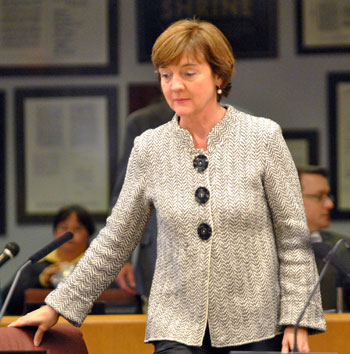
Sue Gott takes her seat for the first time at the board table of the Ann Arbor Transportation Authority. (Photos by the writer.)
First was the election of a new board treasurer, David Nacht, in the wake of two relatively recent resignations from the board – former board treasurer Sue McCormick and Rich Robben. Nacht was elected treasurer though he was absent from the meeting; however, based on remarks from board chair Jesse Bernstein, Nacht had agreed in advance to serve in that capacity.
The board also formally received the report from a financial task force on funding for an expanded, countywide governance and service area. The task force is currently “on hold” following its Feb. 29, 2012 meeting, when it made its recommendations to the AATA. A few days after that task force meeting, the Ann Arbor city council ratified its part of a four-party agreement – between the AATA, the city of Ann Arbor, the city of Ypsilanti and Washtenaw County – that provides a framework for possible transition to a new governance structure for the AATA.
Both the resolution to receive the report, as well as remarks at the board table during the meeting, made clear that the AATA board isn’t committing to an unconditional acceptance of every recommendation made by the task force. Rather, the task force’s recommendations will inform the board’s decision-making.
Also related to possible countywide expansion, at the April 16 meeting, the announcement was made of a special board meeting set for Thursday, April 26 at AATA headquarters, 2700 South Industrial Highway. The purpose of the meeting will be for the board to vote on adoption of a five-year service plan. The plan would be part of a proposal that is eventually put before the general electorate, who must ratify whatever funding plan is used for an expanded transportation authority.
AATA CEO Michael Ford indicated that the working name for the new transportation authority, if one is formed through the four-party agreement, is “Washtenaw Area Transportation Authority.”
The board also made a decision on an unarmed security guard contract that was impacted by the AATA’s adoption of a living wage standard. The hourly wages in the contract now meet the city of Ann Arbor living wage standard, adopted by the AATA board at its June 16, 2011 meeting. The need to bring the wages up to the living wage standard resulted in an increase that met the threshold requiring the board to approve it.
The board also received its usual range of updates and reports from its CEO and committees. Those included recent ridership numbers, an update on the lawsuit that was filed last year against the AATA over advertising issues, the proposed north-south commuter rail known as WALLY, and the AATA’s response to the auditor’s report.
During the meeting, Ford reported on discussions between AATA and the Ann Arbor Public Schools that have led to a preliminary agreement to replace three high school bus routes with existing AATA service – one route each for Huron, Pioneer and Skyline high schools. According to Ford, the change would allow AAPS and the Washtenaw Intermediate School District – which currently handles bus services for AAPS – to eliminate three buses and reduce costs. [Full Story]
Funds Allocated for Washtenaw “Pure Michigan”
As part of funding for a Pure Michigan campaign focused on the Ann Arbor area, the Washtenaw County board of commissioners approved allocating $200,000 to the Ann Arbor and Ypsilanti convention and visitors bureaus (CVBs), out of revenues from the county’s accommodations tax. The vote was taken at the board’s Feb. 15, 2012 meeting.
According to a staff memo, the Michigan Economic Development Corp. (MEDC) is developing a Pure Michigan pilot program, entitled “Sense of Place,” to combine support for tourism and economic development. The Ann Arbor/Washtenaw County area has been chosen as the first region to be featured as a partner in this program.
The campaign will feature a $1 million national TV ad campaign. Ann Arbor SPARK, the local economic … [Full Story]
ACLU Files Motion in AATA Bus Ad Lawsuit
On Nov. 29, 2011, the American Civil Liberties Union of Michigan filed with the U.S. District Court (Eastern District of Michigan) a motion for a preliminary injunction or temporary restraining order, to compel the Ann Arbor Transportation Authority to accept an advertisement it had previously rejected. [.pdf of Nov. 29 ACLU motion]
The previous day, on Nov. 28, the ACLU filed a lawsuit on behalf of activist Blaine Coleman, who had sought to purchase an advertisement for the sides of AATA buses. The AATA refused to run the ad. The proposed ad includes the text, “Boycott ‘Israel’ Boycott Apartheid,” and an image depicting a scorpion-like creature with a skull for a head. [.pdf of image and text of proposed ... [Full Story]
Lawsuit Filed Over Rejected AATA Bus Ad
On Nov. 28, 2011, the American Civil Liberties Union of Michigan filed a lawsuit against the Ann Arbor Transportation Authority in U.S. District Court over an advertisement the transit agency refused to accept for the sides of its buses. [.pdf of complaint] ACLU of Michigan staff attorney Dan Korobkin told The Chronicle by phone that on Nov. 29 a motion will be filed with the court asking for a preliminary injunction, to compel AATA to run the ad.
The ad features the text “Boycott Israel” and “Boycott Apartheid,” with an image depicting a scorpion-like creature with a skull for a head. At its Nov. 17 meeting, the AATA board voted to affirm the rejection of the ad, inviting Blaine Coleman … [Full Story]
AATA OKs Ann Arbor-Ypsi Route Increases
Ann Arbor Transportation Authority board meeting (Nov. 17, 2011): The board’s agenda Thursday night contained two items that were fairly uncontroversial.

Ben Carlisle mans the laptop for the projection onto the screen as his father Dick Carlisle explains to the unincorporated Act 196 (U196) board how an online community input tool can be used to map out suggestions from attendees at public forums. The men are with Carlisle Wortman Associates, an Ann Arbor consulting firm hired by the AATA to help with district planning meetings. The U196 meeting took place on Nov. 14. (Image links to the online participation tool.)
One item was the ratification of a new policy on public input for changes in bus fares and schedules. When the board arrived at the item on the agenda, board member David Nacht, who was first to speak to the issue, suggested the issue was so straightforward that the board could vote immediately.
The board unanimously approved the new public input policy, which distinguishes between major and minor changes to fares and routes, and provides a range of ways that the public is to be notified about such changes. The policy also includes a range of ways the AATA will receive the public’s feedback on such changes.
Another item generating little controversy at the board table was approval of an increase to the number of buses running on the Washtenaw Avenue corridor – between Ann Arbor and Ypsilanti, which is served by AATA Route #4. Again, Nacht led off board discussion on the issue, calling it a “no-brainer.” At the conclusion of his brief remarks, he declared, “Let’s vote!” Others had more to say, but the board eventually approved the increased bus frequency – up to eight buses per hour during peak periods.
Nacht’s apparent eagerness to dispatch with those items with extra efficiency could be attributed to a hour-long closed session the board had held before those votes.
The session was held to deliberate on a request from the American Civil Liberties Union that the AATA accept an advertisement for the sides of its buses that had been previously rejected. When the board emerged from the closed session – held to consider a written opinion of its legal counsel, which is allowed under the Michigan Open Meetings Act – the board voted to affirm the rejection of the ad. The ad includes the text, “Boycott ‘Israel’ Boycott Apartheid.”
In addition to taking those three votes, the board entertained its usual range of committee and staff reports, including updates on a possible transition by the AATA into a countywide authority. Those updates included a report on the second meeting of the U196 – an unincorporated board of a countywide transit authority likely to be formed under Michigan’s Act 196 of 1986.
Another update connected to countywide expansion related to progress on a four-way agreement between Ann Arbor, Ypsilanti, Washtenaw County and the AATA. The four-way agreement would establish the contribution of Ann Arbor and Ypsilanti millage funding to the new countywide authority, and set the role of Washtenaw County to incorporate the new authority.
CEO Michael Ford also announced a $2.1 million federal grant the AATA had received (in addition to a previously announced $2.65 million grant in October) to fund the incremental cost of purchasing hybrid-electric buses.
Thursday’s meeting likely marked the penultimate monthly AATA board meeting for Sue McCormick, who is currently public services area administrator for the city of Ann Arbor. She’s leaving that position to take a job, beginning at the start of 2012, leading Detroit’s water and sewerage department. [Full Story]
Milestone: The Past Speaks in a Silent Film
Editor’s note: The monthly milestone column, which appears on the second day of each month – the anniversary of The Ann Arbor Chronicle’s Sept. 2, 2008 launch – is an opportunity for either the publisher or the editor of The Chronicle to touch base with readers on topics related to this publication.
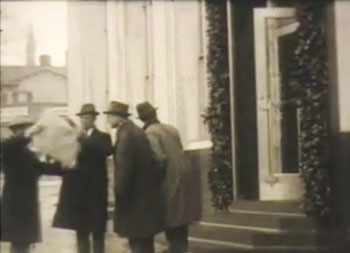
A scene from the "Back Page" silent film, made by the advertising staff of the Ann Arbor News in 1936 and screened this week at the Michigan Theater, with an original score written and performed by Steven Ball on the theater's organ. The men are standing in front of the Huron Street entrance to the News building – that entrance is no longer functional, and the News was closed in 2009. (Image links to Ann Arbor District Library website where the film is posted.)
For about a dozen years, I was employed by the local newspaper, The Ann Arbor News, a publication that no longer exists. As one of the editors, I had influence but not control over what was published.
Now, as publisher of The Chronicle, it’s liberating to have the discretion to choose exactly what appears in our pages. But that freedom is somewhat checked by an over-arching decision to focus on coverage of local government and civic affairs.
It’s not a cherry-picking approach to journalism, which selects topics that might draw the most controversy. Instead, it relies on a methodical, relentless depiction of what happens at public meetings, where decisions are made about how taxpayer dollars are spent, or about public policy that affects our daily lives, even if we’re not aware of it.
Much of The Chronicle’s time is allocated based on our commitment to this model. If there’s a meeting of the city council or planning commission or county board or library board … or the humane society construction bond oversight committee … you’ll likely find us there.
On occasion, we do find time for more playful fare. A recent example of that was a Sonic Lunch photo essay, with fake captions, that we published earlier this week.
I was able to take in another event this week that also reflected the playful side of local media – from 1936. [Full Story]
16th Monthly Milestone

Notebooks used by The Chronicle, made locally by Kate Kehoe out of recycled paper. The front and back covers are made from movie videotape boxes.
Editor’s Note: The monthly milestone column is published on the second day of each month – the anniversary of The Ann Arbor Chronicle’s Sept. 2, 2008 launch. It’s a chance for either the publisher or the editor of The Chronicle to touch base with readers on topics related to this publication.
There’s something hopeful about an empty notebook.
It’s all about possibilities – events that haven’t yet happened, wonky statements that haven’t yet been recorded. Blank pages don’t yet contain anything that’s indecipherable or uninspiring. All of that is still to come – for now, it’s pristine pages, and no shortage of them.
I just stocked up on a pile of new notebooks for The Chronicle. They’re made by local artisan Kate Kehoe, who fashions them from recycled paper and old movie video boxes. I take a perverse pleasure in doing a serious interview while writing in a Hellraiser III notebook.
Notebooks – empty and full – are a good way to think about starting the new year. [Full Story]
13th Monthly Milestone Message
On the second day of each month, The Ann Arbor Chronicle provides a kind of status report about The Chronicle itself in the form of a milestone message written by either the publisher or the editor. We alternate months.
First a note about spam. Long story short, I’ve retrieved many messages from our spam folder in the last month. I may have missed some. My apologies for apparent non-responses.
Two months ago, I wrote about cake. That’s because – as I put it then – “[G]iven a choice between pie and cake, I prefer cake.” Over the years, I’ve put a lot of thought into cake. Deep thought. Nearly 15 years ago I wrote an academic paper in semantics called, “On Having Every Cake and Eating It, Too.” It was 50 pages long and included many diagrams. I bring this up mostly to emphasize that I can go on and on about cake … in a very scholarly way if I have to. No worries, I’m not going to delve into the contents of that old paper – mostly because I don’t know exactly where it is. It would be easier to find if it had been published. [Full Story]
Column: Our Name In Lights
Giddy doesn’t begin to describe the first time I saw my byline in a newspaper – slobberingly gaga comes closer – and I’m anticipating a similar can’t-help-grinning-stupidly jolt when The Chronicle’s name goes up on the Michigan Theater marquee on Sunday.
As our publication grows, we’re looking for ways to let people know what we do. And we’re looking to do that in ways that make sense for us. For example, you probably won’t see us putting flyers on car windshields in the Walmart parking lot – unless, perhaps, we’re doing it as performance art. What’s more our speed? An ad in the program for Burns Park Players’ “Annie Get Your Gun” in February. I was pretty gaga over that, too.
But when I met with the Michigan Theater’s Lee Berry a few weeks ago over breakfast at the Broken Egg and he told me about the possibility of sponsoring the 1939 classic “Mr. Smith Goes to Washington” – well, the fit seemed just about perfect. [Full Story]
Eighth Monthly Milestone Message
Walking home in the drenching rain last week, soaked to the bone and feeling a little sorry for myself, I noted that at least I wasn’t cold – it finally felt like spring. And spring marks the third season of the year for The Ann Arbor Chronicle, another milestone as we check in with our eighth monthly update to readers.
This month we have a few things on the horizon, plus a reminder and some thank yous. [Full Story]
Seventh Monthly Milestone Message
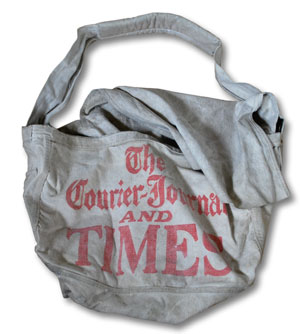
I used this canvas bag to deliver the morning paper in Columbus, Indiana, from 1974 to 1980. The circulation area for the Louisville Courier-Journal extended only as far north as Columbus. More people in Columbus subscribed to the Indianapolis Star, or else the local afternoon paper, The Republic. But some people subscribed to all three.
It’s my turn to write the monthly milestone – an update about The Chronicle. Here’s a nuts-and-bolts outline, with a longer version after the break.
- Events: List them yourself on The Chronicle by registering for an account on Upcoming and creating the event listings there. Let us know when you’ve done that, and we’ll add them to our “watch list,” which will make them appear on The Chronicle’s event listing. It’s free.
- Emailed updates: Shoot us an email saying you’d like to receive weekly story summaries, and we’ll send them to you – with links to the complete story.
- Advertising crew: As part of our ongoing effort to increase revenues to support expanded coverage in The Chronicle, there’ll be some folks out there in the community earning commissions by convincing advertisers to place ads in The Chronicle. If you think you’ve got what it takes to sell ads into The Chronicle, let us know.
- Print and thoughts on newspapers: Printing off a page from The Chronicle should look a bit better than it used to. Regarding the contrast between news on-screen versus printed on paper, Del Dunbar’s column that we ran back in September 2008, our first month of publication, is a better read than ever. [Link to Del Dunbar's column.]
Sixth Monthly Milestone Message
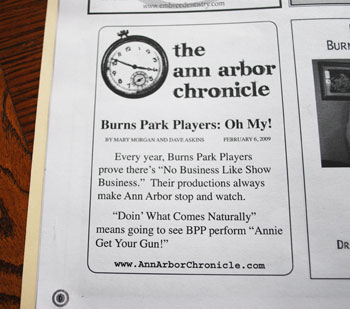
The Chronicle's ad in the Burns Park Players program for "Annie Get Your Gun." It was the first-ever ad that we'd purchased, and gave us a thrill to see it when we attended the Feb. 7 show.
I generally brace myself when February rolls around – it doesn’t have a great track record of bringing the best of times, in my experience.
This year was different.
February treated The Chronicle okay. In spite of continued grim economic news, we’ve signed on new advertisers. In spite of the media’s general belief that readers have super-short attention spans, we’ve gained new readers – and you might have noticed that we don’t always write short.
Yeah, this sounds pretty self-congratulatory. I can’t help it. Each business, nonprofit or professional who spends their advertising dollars with us or contributes via our Tip Jar, each person who spends some of their time reading The Chronicle – when they have a hundred other things calling out for their attention – is a precious thing to us, and we celebrate that unabashedly.
A lot happened in February, including several things we’re doing aimed at spreading the word about our publication. For our sixth monthly milestone message, here’s an update on what we’ve been up to. [Full Story]
And Now A Word From Our Sponsors
Occasionally, we like to remind readers of the reason The Ann Arbor Chronicle is able to keep publishing: Advertisers have invested their dollars in ads that appear in the sidebars of the site. So every once in a while we’ll highlight those advertisers here in the center column. [Full Story]
Fourth Monthly Milestone Message
Back in early September, only a week or so after we launched The Ann Arbor Chronicle, I trekked up to Lansing to meet with our locally elected state legislators. Man, I had grand plans. I’ve never found a good resource for learning about what our state lawmakers are doing, and I thought The Chronicle could be that resource.
The women I met with could not have been more gracious. The three state representatives – Pam Byrnes, Alma Wheeler Smith and Rebekah Warren – work in adjacent offices in a building with spectacular views of the capitol across the street. I met some of their staff, and talked with each about their goals and priorities for the year. Liz Brater, the state senator who represents Ann Arbor, gave me a tour of the Senate chambers. And I wrapped up the day by joining Rebekah Warren and Alma Wheeler Smith while the House was in its afternoon session (their desks sit next to each other on the House floor, but not because Alma is Rebekah’s mother-in-law). I even acquired a press pass for the rest of the year, which involved filling out some forms and getting my picture taken. [Full Story]
The Future of Journalism
“I’ve never seen reporters so excited as when they’re talking about their Twitters,” remarked Gil Klein, moderator of a panel discussion Wednesday night at the Gerald R. Ford Library in Ann Arbor. The discussion was part of a nationwide tour of similar events hosted by the National Press Club as a part of the organization’s 100th anniversary. Klein, director of the National Press Club’s Centennial Forums, mentioned the micro-blogging platform Twitter in the current context of the tremendous period of innovation in the field of journalism.
But the consensus among panelists … [Full Story]
Third Monthly Milestone Message
Today marks the third month of publication of The Ann Arbor Chronicle. As we have on the previous monthly milestones, we take this opportunity to touch base directly with readers.
We’ve made a couple of minor changes to the layout. The left sidebar is now a bit cleaner, partly because we’ve consolidated some material into the top shaded box.
In response to reader suggestions, we’ve also made the the link to the Tip Jar as prominent as we know how. It’s sitting in the masthead where the news stand price is typically displayed for a printed publication (upper right).
Also based partly on reader input, the frame for the advertisements now contains a link (at the bottom) to a … [Full Story]





